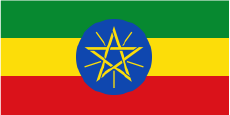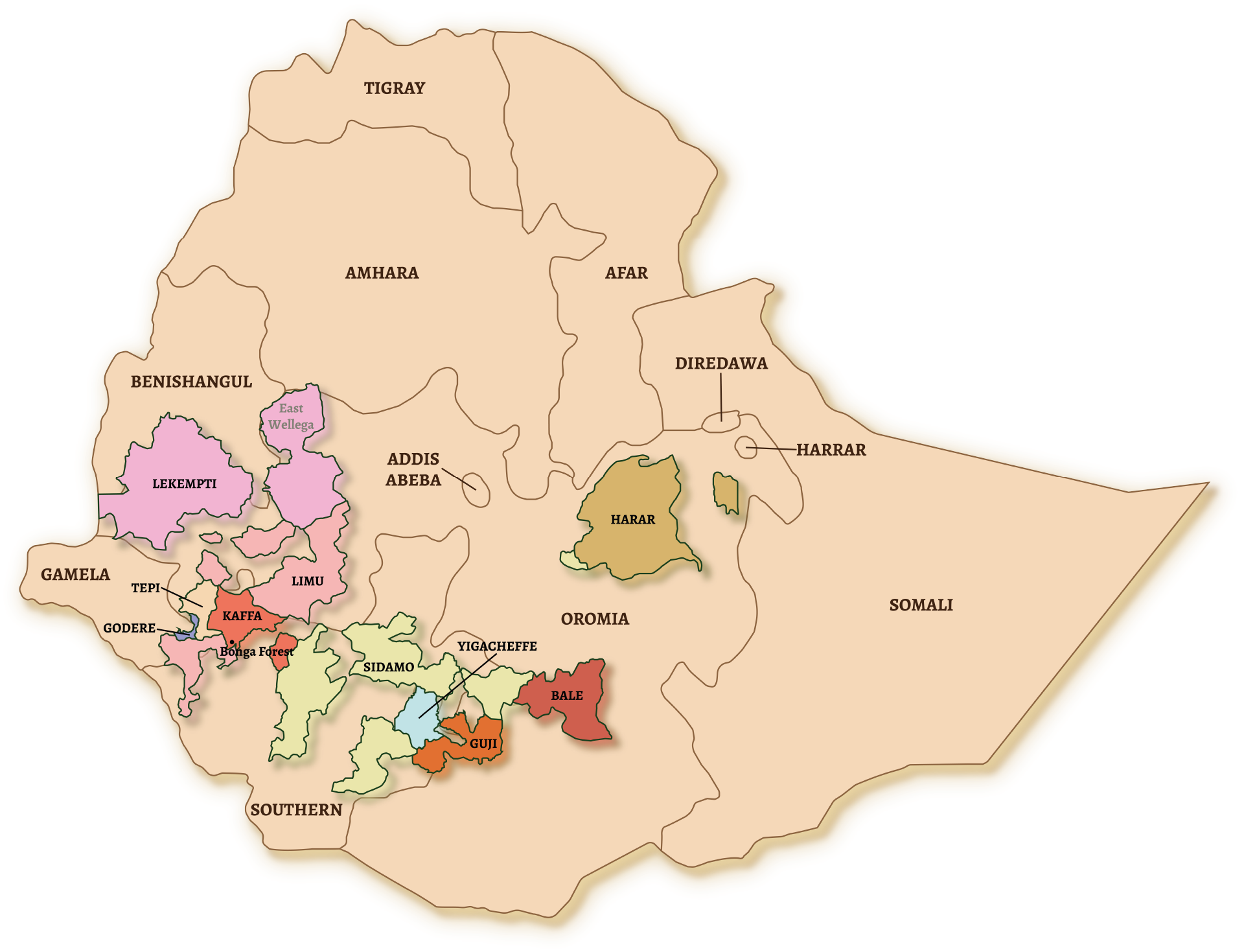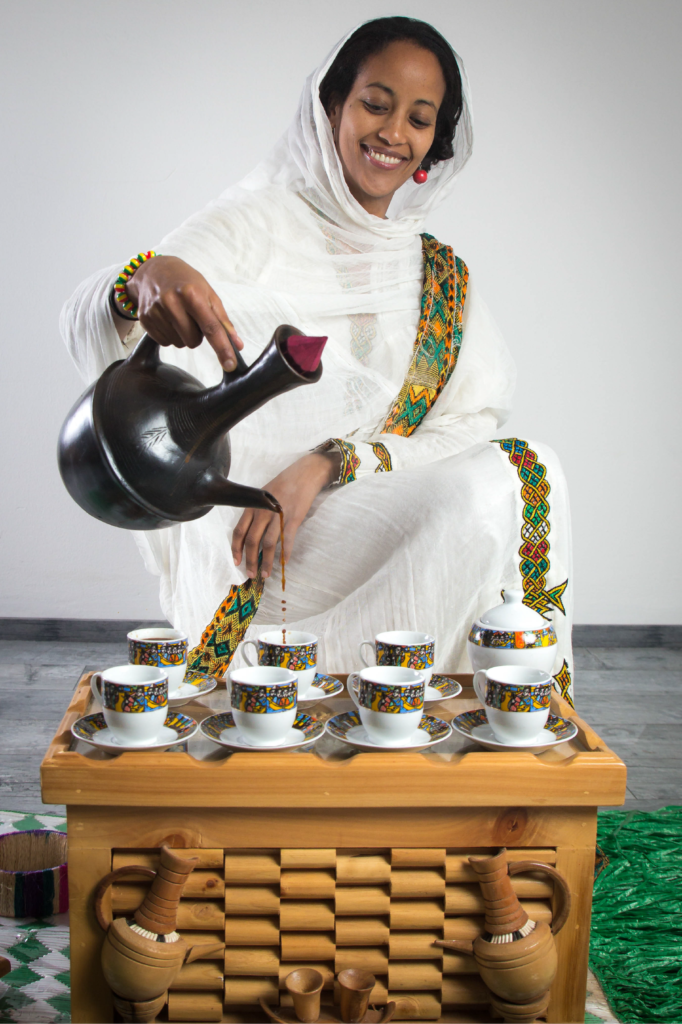
Ethiopia is a landlocked country on the Horn of Africa. Bordering Eritrea, Sudan, South Sudan, Kenya, Somalia and Djibouti, Ethiopia is the heart of East Africa. Originally founded in 980 BC, the country is the oldest independent nation on the continent. At the time of the Empire of Abyssinia, the country was also known as Abyssinia.
It is famous for being the place where the coffee bean originated, unique Orthodox traditions and beautiful natural landscapes. In fact, is home to the most African UNESCO World Heritage sites and to over 70% of all African mountains. Ethiopia is also the top African coffee and honey producer and has the largest livestock population in the continent. With over 80 ethnic groups and 84 indigenous languages, Ethiopia is a multi-ethnic state and the most populous landlocked country in the world. English is the language of educational systems in addition to local languages including Oromo, Amharic, Somali and Tigrinya. Additionally, Ethiopia has its own alphabet and calendar.

Coffee production in Ethiopia is a longstanding tradition dating back centuries. The coffee plant originates in Ethiopia. According to legend, the 9th century goat herder Kaldi discovered the plant after noticing the energizing effect it had on his flock. The legend speaks of a curious goatherd who noticed that his flock was acting remarkably lively all night and followed them to a bush with red berries. The shepherd then took them to a nearby monastery. The monks then attempted to draw the stimulating effect from the berries in a variety of ways. After several, less tasty attempts, they gave up and, disappointed, threw the fruit into a fireplace. Immediately, a fragrant aroma developed. The monks took the roasted beans and made tea from them, the common drink of the time. Thus began the breakthrough of coffee. The name coffee is traced back to the region „Kaffa“, where the shepherd discovered coffee.

Coffee is hand-roasted and hand-ground in Ethiopia.
More than 15 million people in Ethiopia, or about one-sixth of the total population, make their living within the coffee sector. Trade in coffee is central to the country’s economic development. Besides cultivation and export, people in Ethiopia also enjoy drinking coffee. Coffee culture is very important- a central part of social and cultural life is the coffee ceremony, illustrating the hospitality in Ethiopia.
The coffee ceremony is used to honor special guests, celebrate festive occasions, or simply to celebrate a gathering of friends. Being invited to a traditional coffee ceremony is therefore a sign of respect and friendship, and declining an invitation is thus considered impolite. Coffee ceremonies take some time – it consists of three rounds of coffee, and the time is often used to relax, gain new strength, exchange ideas and to talk and discuss about everyday topics. It is not only celebrated in rural areas, as it has also become increasingly important in cities in recent years. Both in shopping malls and in city parks, people are often invited to a coffee ceremony.
The coffee ceremony starts with the washing of green coffee beans. Afterwards, the beans are roasted in a small pan on an open fire, with constant stirring and shaking, until they develop a nice brown color and a fragrant aroma. To achieve a high-quality roast, experience in roasting is essential. The freshly roasted beans are then ground by hand with a coffee grinder and poured into the Jebena, a traditional Ethiopian coffee pot made of clay. This is brewed with hot water. The finished coffee is traditionally served in small porcelain bowls.
The coffee is usually drunk black with plenty of sugar. In some circles, it is also drunk with a little salt or served with popcorn („fendischa“) or roasted and spiced cereal („kollo“). The entire coffee ceremony is accompanied by the pleasant smell of incense.
But what does the coffee ceremony look like in reality?
For this we have a small suitable video, which shows the process from the beginning to the end. The video was recorded in the region of Bonga in Ethiopia.
Roasted at Origin imports and distributes high-quality, sustainably grown and locally roasted coffee from Ethiopia.
Ethiopia is the 5th largest coffee exporter in the world. However, from the 390,000 metric tons of coffee that is produced annually, only less than 1% of its coffee is exported as roasted coffee. The rest is sold as raw coffee – meaning that Ethiopian coffee farmers have a limited share of the value added processes, and thus, a limited share of profit.
We intend to act as a change maker in the coffee business in Ethiopia. We would like to encourage Ethiopian coffee producers to add value to the country’s domestic products by importing domestically roasted coffee from different, small producers and distributing it in various European countries. Equally as important is the creation of sustainable economic development for Ethiopian coffee producers in all areas of the value chain. In order to contribute to the economic development of Ethiopia, processes that usually do not take place in the country, such as roasting and packaging of coffee, are to be carried out in the country of origin. To this end, Roasted at Origin brings together the individual stages of the value chain: coffee farmers, roasters, packaging and logistic companies.